Amid the vigorous flow between Korea and Russia of both the arts and tourists, at their summit in November last year, the leaders of the two countries designated the years 2014 and 2015 as, “The Years of Reciprocal Visits Between Korea and Russia.”
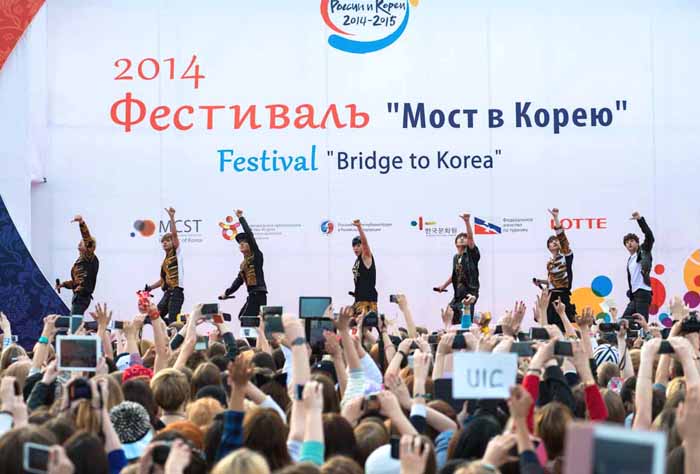
Bangtan Boys, a seven-member hip-hop group, performs during the Bridge to Korea festival at the VDNKh park in Moscow, Russia, on June 14.
Backed with the keenest interest in an Asian country ever seen in Russia, the Korean government has hosted an array of special events at the All-Russian Exhibition Center (VDNKh) in Moscow, all aimed at raising awareness of what Korea really looks like and what kind of arts it truly embraces.
Supported by the Korean Ministry of Culture, Sports and Tourism, three meaningful events -- the Bridge to Korea festival, the 2nd Russia-Korea Tourism Forum and the Korean Medical Tourism convention -- were underway at the VDNKh in Moscow from June 13 to 15.
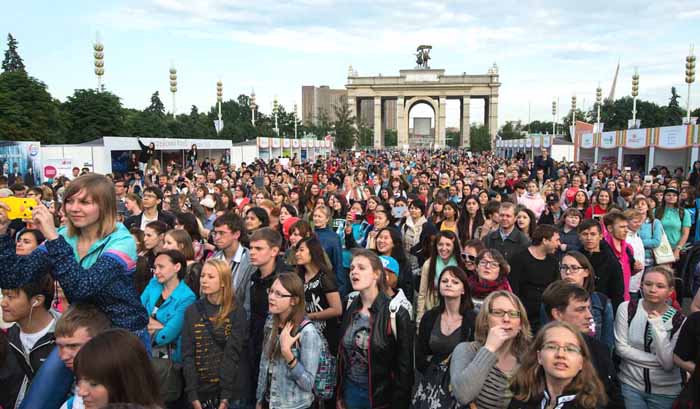
More than 10,000 people gather to watch the Bridge to Korea festival featuring a Korean hip-hop group and some traditional performers, on June 14 in Moscow, Russia.
More than 10,000 spectators flocked to the VDNKh park in Moscow on June 14. With the Bridge to Korea festival fully underway, the venue heated up as a group of traditional performers performed some samulnori songs, a style of percussion quartet, and played highlights from the traditional musical “Miso.”
The shouts and cheers from the audience reached their highest pitch when the seven-member hip-hop band Bangtan Boys came on stage.
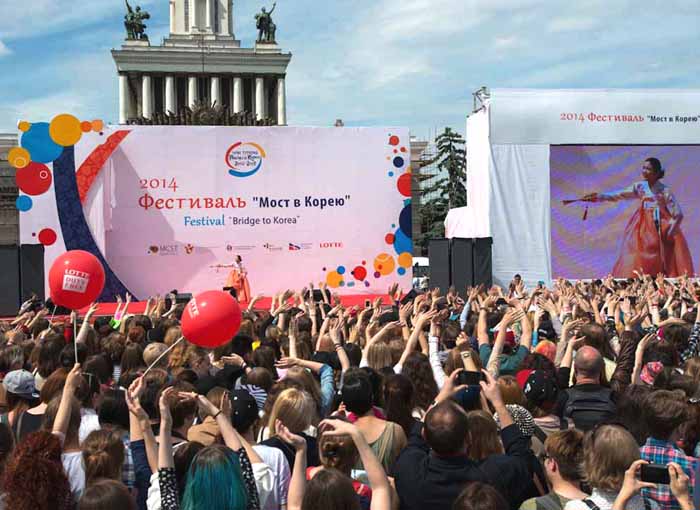
Spectators enjoy excerpts from the traditional musical “Miso” at the VDNKh park in Moscow, Russia, on June 14.
Near the concert venue was an endless line of people, all eager to take a bite of some traditional Korean delicacies and to try on traditional hanbok attire.
After a long wait, they finally reached a booth where they could sample some of Korea’s popular street foods, such as patbingsu, a dessert of red beans and fruit on ice shavings, traditional sweets and cookies, known as hangwa, and some of the fancier dishes only enjoyed on special occasions.
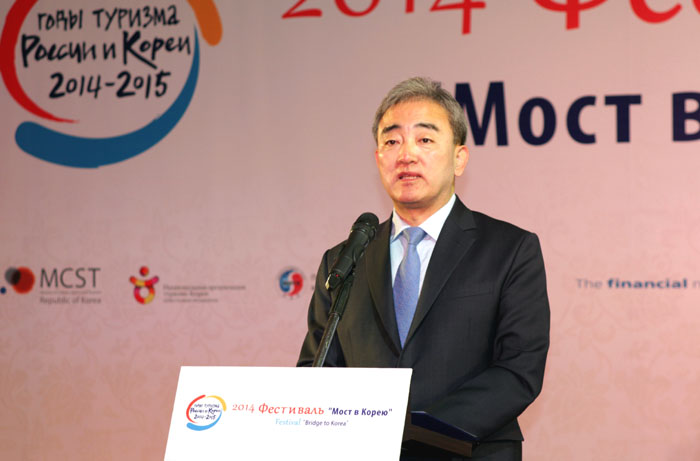
Minister of Culture, Sports and Tourism Yoo Jinryong delivers a speech during the opening ceremony of the Bridge to Korea festival in Moscow, Russia, on June 13. (photo: Yonhap News)
Prior to the festival, on June 13, a series of discussions concerning medical tourism, a sector that has recently flourished between the two countries, took place during the 2nd Russia-Korea Tourism Forum and the Korean Medical Tourism convention.
Last year, more than 24,000 Russian medical tourists arrived in Korea, a figure high enough to beat Japan and to take third place, after China and the U.S.
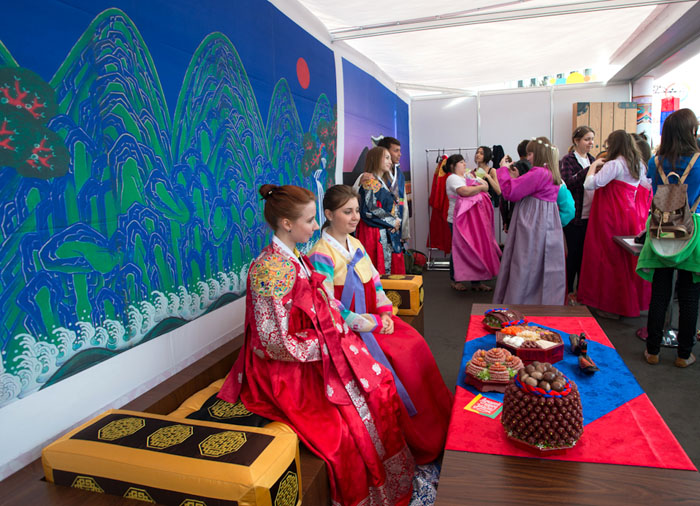
Moscow residents try on traditional hanbok attire.
“Up until now, Russian patients only looked at close neighbors, such as Turkey or Israel, as possible destinations for medical tourism,” said an official involved in the Russian medical tourism sector. “It’s literally a shock how Korea’s medical technology has improved over the years.”
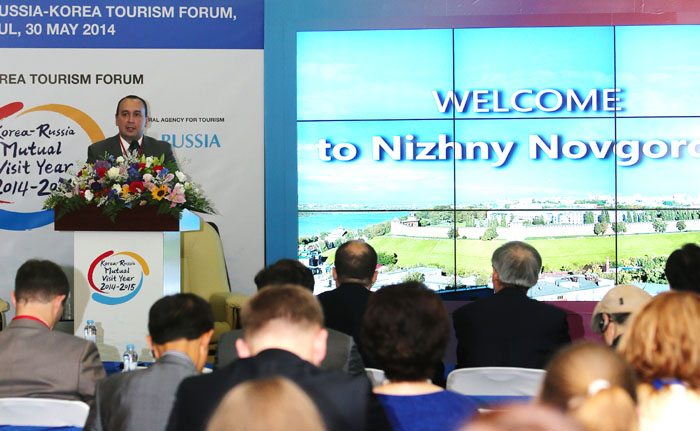
The 2nd Russia-Korea Tourism Forum, held in Moscow, Russia, on June 13, focuses on how to boost bilateral medical tourism between Korea and Russia.
In response, Minister of Culture, Sports and Tourism Yoo Jinryong emphasized that, “The no-visa entry treaty, one of our major achievements, made at the Korea-Russia summit during Russian President Putin’s state visit to Korea in November last year, and also the designation of 2014 and 2015 as ‘Years of Reciprocal Visits between Korea and Russia,’ have accelerated tourism exchanges between our two nations.”
The minister also stressed that it’s, “high time to make the peoples of the two nations feel closer to each other, with the very goal of achieving a sincere boost in such mutual interchanges.”
Meanwhile, he affirmed that, “Korea and Russia, as closer-than-ever partners who share the vision for a ‘Eurasia Initiative,’ will continue to take crucial steps to enhance bilateral arts and tourism exchanges. We will, for sure, see many more Russians coming to Korea, going way beyond the current figure of 270,000, to hit 500,000 and even one million.” The Eurasia Initiative is a goal set by the Korean government where travelers would be able to travel by train across the peninsula and beyond, to Russia, China and Europe.
The ministry plans more such events next year to bring the two peoples closer together.
By Sohn JiAe
Korea.net Staff Writer
jiae5853@korea.kr